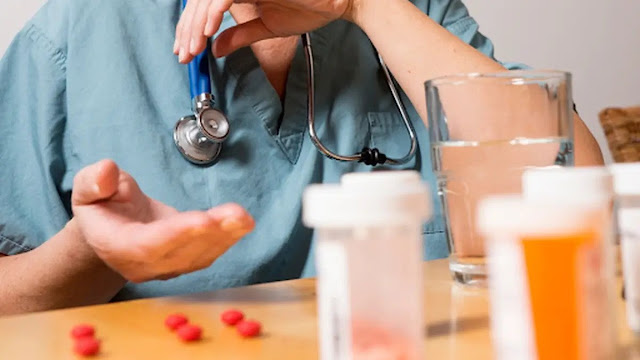“It’s weird to say I’m an IV drug user but I am,” says Leslie L., a Registered Nurse in Georgia. Leslie says her addiction began when she was working as a surgical nurse at a hospital in Georgia. She accidentally took Dilaudid home in her pocket she had meant to waste. She called her employer who told her to throw the drug away and not to worry. But Leslie says she had seen the effects narcotic drugs had on her patients, and she wanted to get a good night’s sleep and to “…. stop the world for a minute….” Within the week Leslie says she was addicted to narcotic drugs and regularly diverting from her employer, taking narcotics meant to be wasted by the end of her shift. “If you told me I was going to try heroin I would have recoiled. ‘Oh my God are you crazy,’” she says. Leslie diverted narcotics for about a year before her employer intervened.
Alternative To Discipline Programs (ATD)
Leslie is not the only Registered Nurse to confront addiction. The number of nurses struggling with addiction is an estimated ten percent and is on par with the rates of addiction in the general public. And with the pandemic raging, the number of nurses facing addiction battles may be rising too. Alternative to Discipline (ATD) programs began in the 1980s when state boards of nursing began to see addiction as a disease and offer help to addicted nurses instead of automatically removing them from practice. Today there are ATD programs in 40 states across the country, and length and requirements vary among the programs. What’s more, ATD programs are underutilized, with low enrollment numbers compared to the population of nurses in most states. The National Council of State Boards of Nursing (NCSBN) conducted an analysis of ATD programs and found that successful programs last at least 3 years and include frequent check-ins and random drug testing using different methods, including hair, and nails, and urine. Additionally, NCSBN found program completion rates for ATD programs to be between 52%-72%. This year NCSBN plans to conduct a pilot study this year to measure program outcomes beyond ATD programs.
Ridgeview Institute: A Successful Program
Leslie L. is currently under a 5- year consent order from the Georgia State Board of Nursing and enrolled in a treatment program at Ridgeview Institute in Smyrna, Georgia. Ridgeview Institute offers a comprehensive treatment program for nurses struggling with addiction. “Ridgeview offers 5 years of monitoring, and that monitoring is a nurses’ group and generally a therapy group,…The nurses have to call in every day and see if they have a drug screen, “ says Donna McGrane, RN Community Liaison at Ridgeview.
According to McGrane, the state writes up the requirements for the diverting nurse. After an investigation, the Georgia State Board of Nursing issues a consent order and a formal mental evaluation. A nurse’s treatment experience is based on the results of that mental evaluation and recommendations of a treatment team. Ridgeview then monitors the results of the drug screens and makes sure nurses are in compliance with state requirements.
McGrane says the nurses in the program get close because of their shared experience and have an intimate bond that is special to see. “They know what it's like to be the patient now,” McGrane says. According to McGrane a program with support is huge. Ridgeview also offers a mixed professionals group made up of addicts from a variety of professions including nurses, doctors, pilots, and pharmacists. There is a common thread that runs through these professions, says McGrane.
The Coming Addiction Crisis?
McGrane says she has seen firsthand the negative effects the stress of the pandemic has placed on the nursing profession. According to McGrane, she has seen more nurses entering the program with depression and drug and alcohol relapses since the start of the pandemic. “Nurses come to our program saying ‘I can’t watch another person die,’” she says. According to McGrane, nurses who did not have a problem with alcohol or drugs before the pandemic is at risk when they turn to addictive substances as stress relief. “Definitely in the recovering community there have been more relapses,” McGrane says.
Paying the Piper
Leslie L. credits Ridgeview with saving her life, but she says the corporate nature of treatment is a drawback to the treatment model. “They may admit you for a few days without payment but you can’t enter into the program without substantial financial resources. If you don’t have the financial resources, you may be out of luck,’ Leslie says. Donna McGrane agrees. “The challenge is the hospital fires them and then the nurse doesn’t have the health insurance and they don’t get the help,” McGrane says. Leslie L. was one of the lucky ones. “I was fortunate enough I did not lose my job,” says Leslie. “I was asked to resign, but not before I went on medical leave and FMLA. I had insurance to get me through it,” she says. Ridgeview gave her a safe comfortable place to begin to recover, Leslie says.
Leslie works in case management now, and although she misses bedside nursing, she is in a good place in her life and career now. She will be at the end of her 5-year consent order this coming August and she feels ready to manage sobriety on her own. Leslie says, “Between Ridgeview and the Georgia Board of Nursing I don’t know if I would be here.”
Getting Help Now
If you are facing mental or substance abuse struggles SAMHSA’s National Helpline, 1-800-662-HELP (4357) (also known as the Treatment Referral Routing Service), or TTY: 1-800-487-4889 is a confidential, free, 24-hour-a-day, 365-day-a-year, information service, in English and Spanish, for individuals and family members facing mental and/or substance use disorders. This service provides referrals to local treatment facilities, support groups, and community-based organizations.
Source: nurse.org







0 comments:
Post a Comment